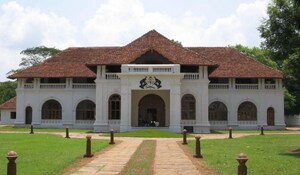Body
the Mattancherry Palace Kochi, also known as the Dutch Palace, is a remarkable historical site that reflects the rich cultural and colonial heritage of the region. Built in the 16th century, this architectural gem offers visitors a unique insight into the history of the Kochi royal family and the influence of European colonization in India. In this article, we will explore the history, architectural features, cultural significance, Mattancherry palace Timings, and practical visiting information about Mattancherry Palace.
Historical Background
The Mattancherry Palace was originally constructed by the Portuguese in 1555 as a gift to the Rajah of Kochi, Veera Kerala Varma, to strengthen trade relations. The palace was intended to serve as a residence for the Kochi royal family and as a diplomatic gesture to secure favor with the local rulers. However, the palace was later renovated and expanded by the Dutch in 1663 after they took control of the area, leading to its popular name, the Dutch Palace.
The palace's history is deeply intertwined with the trade dynamics of the region. Kochi was a crucial hub for spice trade, attracting European powers eager to establish control over this lucrative market. As such, the Mattancherry Palace stands as a testament to the historical interactions between the local rulers and colonial powers, showcasing the complexities of cultural exchange and diplomacy.
Architectural Features
Unique Design
The architectural design of Mattancherry Palace is a striking blend of Portuguese, Dutch, and traditional Kerala styles. The structure is built in the typical Kerala style, featuring sloping roofs, spacious courtyards, and intricate wooden pillars. The palace is laid out in a quadrangular format, with a central courtyard that allows for ample natural light and ventilation.
Interior Highlights
Inside the palace, visitors are greeted by an array of stunning murals and paintings that depict scenes from Hindu mythology, particularly from the Ramayana and Mahabharata. These murals are among the finest examples of Kerala’s traditional art, illustrating the region's rich cultural heritage. The detailed artwork provides a glimpse into the artistic talents of the time and the significance of mythology in local culture.
One of the most notable features of the palace is the coronation hall, where royal ceremonies were once held. This room is adorned with elegant wooden ceilings and provides insight into the ceremonial practices of the Kochi royal family. The palace also contains a variety of artifacts, including royal memorabilia, weapons, and ceremonial items, offering a deeper understanding of the lifestyle and traditions of the time.
Gardens and Surroundings
The palace is surrounded by beautifully maintained gardens, adding to its charm. These gardens provide a serene atmosphere, making them an ideal spot for visitors to relax and reflect on the historical significance of the site. The landscaped grounds enhance the overall beauty of the palace, creating a picturesque backdrop for photography.
Cultural Significance
Mattancherry Dutch Palace holds immense cultural significance, serving as a symbol of the harmonious coexistence of diverse communities in Kochi. It reflects the rich history of the region, where various cultures and traditions have blended over centuries. The palace is not only a historical site but also a cultural hub that hosts various events and exhibitions, showcasing local art and heritage.
Moreover, the palace plays an essential role in the preservation of Kerala’s history. It attracts numerous visitors, scholars, and historians who come to learn about the region's past and the influences that have shaped its identity. By serving as a venue for cultural events, the palace helps promote awareness and appreciation of Kerala’s diverse heritage.
Visiting Dutch Palace Mattancherry Kochi Kerala
Location and Accessibility
Mattancherry Palace is conveniently located in the Mattancherry area of Kochi, making it easily accessible for tourists. Its proximity to other historical attractions, such as the Paradesi Synagogue and the Spice Market, makes it a perfect stop for those exploring the cultural richness of the area.
Entry Fee and Timings
- Entry Fee: The entry fee for Indian citizens is INR20, while foreign nationals are charged INR100. This nominal fee contributes to the maintenance and preservation of the palace.
- Timings: The palace is open to visitors from 9:00 AM to 5:00 PM on all days except Fridays. It’s advisable to check local resources for any changes in timings or special events.
Tips for Visitors
- Guided Tours: Consider taking a guided tour to enhance your experience. Knowledgeable guides can provide valuable insights into the history and significance of the palace, enriching your understanding of the site.
- Photography: Photography is allowed in certain areas of the palace. Be sure to follow any guidelines provided by the staff to ensure respectful and appropriate use of your camera.
- Nearby Attractions: After exploring Mattancherry Palace, take time to visit nearby attractions such as the Paradesi Synagogue, the historic spice markets, and the quaint streets of Jew Town. Each of these sites contributes to the rich cultural experience of Kochi.
- Plan for Weather: Kochi has a tropical climate, so it's advisable to visit in the cooler months from October to March. Carrying water and sun protection is also recommended for comfort during your visit.
Conclusion
Mattancherry Palace, also known as the Dutch Palace, is a remarkable historical site that offers a captivating glimpse into Kochi’s royal heritage and colonial history. With its unique architectural features, stunning murals, and rich cultural significance, the palace stands as a testament to the region’s diverse past.
Whether you are a history enthusiast, an art lover, or simply a curious traveler, a visit to Mattancherry Palace promises an enriching experience. Its fascinating history and beautiful surroundings make it a must-visit destination in Kochi, inviting visitors to explore and appreciate the cultural tapestry that defines this vibrant city.













Comments